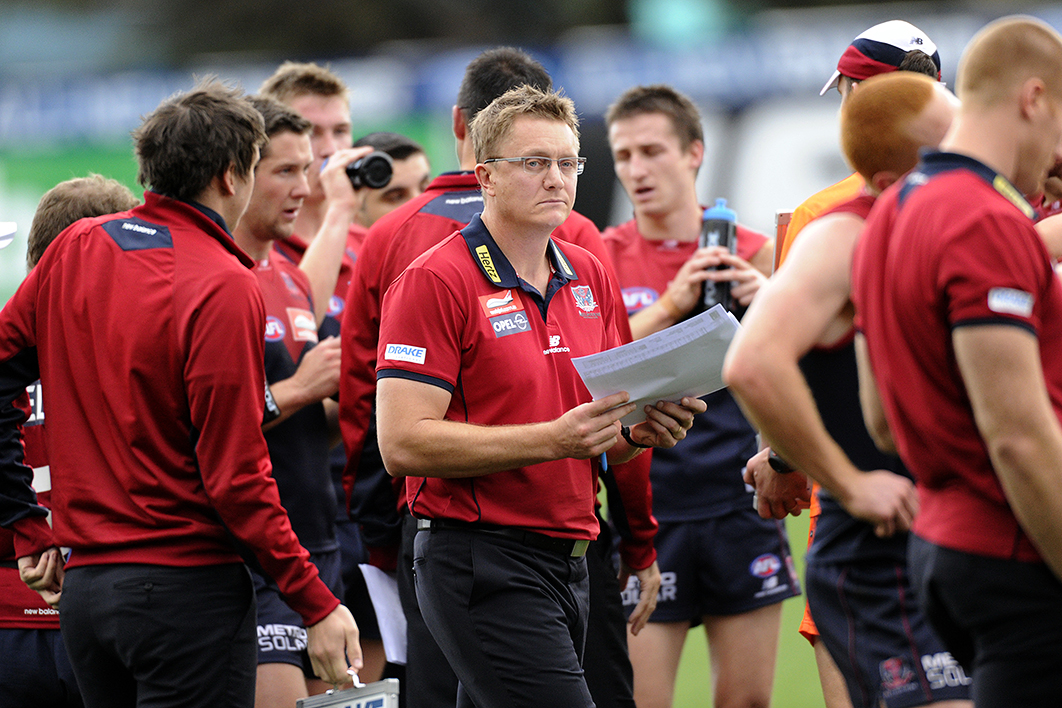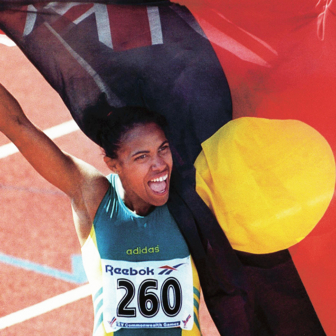I’m a long-suffering Melbourne supporter. That’s the AFL team that got thrashed again last weekend. I can’t help my affiliation, of course – or should I say affliction? Barracking is hard-wired; it is like a totem assigned by some mystery of culture; it is imbibed with milk and language. It is a fate to which one is condemned. Choice never had anything to do with it.
Next year it will be fifty years since my team won a premiership. That’s unusual but not unique. But that half-century is a whole lifetime of conscious barracking, and such sustained lack of success, decade after decade, begins to bruise your sensibility. Low expectations, irony, a feigned lack of interest, wry bitterness – these attitudes begin to shape your winter weekend.
There are many compensatory benefits in being an underdog, a good loser, a sad clown, a hilarious cynic, a brave martyr, a loyal fan, a resilient supporter, a denizen of that great temple, the MCG, and – more desperately – a devotee of the oldest club in the league. But Melbourne has always been a little embarrassing to follow, for it was also the club of the well-heeled, those silvertails in jackets who lounge in the Members’ Stand and refuse to join in the Mexican wave at the Boxing Day cricket. At least Melbourne Football Club’s appalling record is proof that money – or establishment money, anyway – can’t buy success in the AFL, whatever the recent Australian Crime Commission report might suggest.
What would success taste like – and could I cope with it now? I don’t think I’ll be tested soon. The last few years have seen a new nadir in the team’s fortunes and I’ve noticed a distinct change in Melbourne’s place in football culture. It is normal and healthy for a losing team (and especially one that loses a lot) to become the butt of jokes. Disdain and contempt are rightly poured from a very great height. I can cope with that. I’m used to it. I have honed my survival strategies over decades. But now there is something new I cannot cope with. It is pity.
It began in Round 19 in 2011 when Melbourne was defeated by Geelong by 186 points in what was described as “the meekest surrender in the game’s history.” People feel sorry for me now, for being a Melbourne supporter. Their concern is genuine and it is combined with a kind of incredulous disbelief. Really? You barrack for Melbourne? You still barrack for Melbourne? Get a life, man!
Surely they understand that one is condemned, that there is no choice? I crave the disdain and contempt. I yearn for the disrespectful badinage served up to an almost-equal. Pity is unbearable.
After last weekend’s debacle, when my team was again booed off the field by its own supporters, the relatively new coach, Mark Neeld, fronted up for yet another depressed and depressing press conference in which he looked and confessed to being “shell-shocked.” “It’s a damn long road and it’s a hard one,” he explained. If that’s how he feels after just one year with the club, what does he think fifty such seasons feel like? All last year, “Neeldy” regretted that his players hadn’t yet got the hang of the “game plan.” Getting goals seemed too complex an idea for them. But now he tells us with a sense of achievement that their theory is exemplary: “if it was an exam, it was 100 per cent correct,” he declared to the press. They now play perfectly correctly at training, he assured us. He was genuinely puzzled that it just doesn’t seem to work on the day of the game – on any day, in fact, when another team is on the field. But at least my team is now stunning at training. Mark says he is trying “to keep an elite mindset going” at the club. He announces that “we believe we train like an AFL team.”
Melbourne trains (even if it doesn’t play) like an AFL team. One could almost think it were one! This is where pity takes you – to a mentality where even the coach cannot help betraying the conviction that he is working in the second division.
THERE was one bright spot in my barracking career. It was 1987. The 1964 premiership was already far back in the mists of time, and Melbourne had laboured through many long, dark years. In the 1980s, the team was graced with the balletic skills of an extraordinary player, Robert Flower. Even his name seemed to capture his delicacy, and it is a wonder that a light, fine-boned man could distinguish himself on such a gladiatorial turf. Robbie Flower swept along the wing of the MCG with a speed and sureness of touch that defied opponents and gravity, but he was a shining star in a losing team. He seemed destined never to play in a final. Then something utterly surprising happened.
In the middle of 1987, Melbourne started winning. Not just squeaking home, but running wild and free to victory for the sheer fun of it. They were “the Cinderella side,” a young team with a new Irish recruit, Jim Stynes. I watched, disbelieving and hardly daring to breathe, as a fairy tale unfolded. Robbie Flower was captain; it was his last season; they were doing it for him. It was one of those moments when joy and chemistry took over and corporatism and “game plans” seemed irrelevant.
Melbourne had come second last the year before and was improving in 1987, but they hardly looked like making the Final Five. The surge began in late July. They won six in a row and just snuck into the finals, achieving an unlikely fulfilment of Flower’s dream. But now it seemed they couldn’t stop. They had a runaway win by 118 points over North Melbourne in the qualifying final. Then they blitzed Sydney by seventy-six points in the semi-final. The preliminary final was against Hawthorn and again the underdogs ran hard and fast and led all day with sheer momentum and exuberance. In the final quarter Hawthorn pegged them back, but still it seemed that Melbourne was home and into their first grand final since 1964.
The final minutes and seconds ticked away and the lead was intact. The gifted Hawthorn forward, Gary Buckenara, was awarded a free kick just beyond the fifty-metre line. Then the siren sounded. The game was over and Melbourne had won. Supporters started celebrating. But the umpire did not hear the siren over the joyous, relieved roar of the Melbourne crowd. The siren blared without stopping but went unheeded by many on the ground. The game continued. Buckenara went back for his kick. Jim Stynes, who had not heard the siren, cut across the ground to pick up a loose man and ran across Buckenara’s mark. The umpire, who still awaited the siren, awarded a fifteen-metre penalty, bringing Buckenara within range. He kicked truly. Hawthorn supporters ran onto the ground. Everyone woke up. The fairy tale was over.
Something inside me died that day. The cruelty was exquisite. I was cradling my daughter, three months old, as the siren sounded and Melbourne’s win turned to ash. I was struck dumb. I handed our precious baby carefully to my wife and went for a long, lonely, bitter walk. Football was never the same again.
Jim Synes died prematurely of cancer at the beginning of 2012. He always said that it was the last seconds of the 1987 preliminary final that gave him the flinty determination to become great, to win the Brownlow Medal, to play a record 244 consecutive games. When he announced his illness to the media he showed them his number 37 jumper, the one he had worn that fateful day on the MCG; it had become a symbol of challenge. As club president, he had rescued Melbourne from debt, and his battle with cancer lifted hearts. But his death depressed the players rather than inspiring them. The 2012 season was, for Melbourne, the most miserable I had experienced. No one could ever quite remember the game plan. The sole highlight had been Melbourne’s failure to lose to an Essendon team disabled by the mid-season regime of their club pharmacist.
By the start of 2013, my customary enthusiasm for the game had withered further. My team had just been found guilty of behaviour “prejudicial to the interests of the AFL” after charges of tanking in 2009, other teams were suspected of injecting their players with illegal drugs in 2012, bookie Tom Waterhouse dominated sports coverage and, in the first game of the season, Essendon’s coach continued to rule the turf on national television as if unaffected by the scandal engulfing his club. As the opening round continued to sprawl over two weeks, I wisely chose not to watch Melbourne get humiliated by Port Adelaide. Instead, I walked to Etihad Stadium with my twenty-five-year-old daughter (who had survived the end of the 1987 preliminary final and does not barrack for Melbourne) and we watched North Melbourne play Collingwood.
It was overcast and raining lightly. The game had begun by the time we arrived and the stadium was booming. The roof at Etihad was closed and the interior glowed and beckoned like a theatre set. As I stepped inside, I felt a familiar awe at the sheer scale and grandeur of this performance, at the bravery of the young men on the sacrificial field and at the passionate decency of their supporters. I joined a mixed group of Magpies and Kangaroos, strangers to one another who were drinking beer as they watched the game. They could not see my demonic heart, so they did not pity me. They honoured me with their churlish respect. Since I was at Etihad, they assumed I barracked for a first-division team. They were unbridled in their support of their own teams but had the capacity to grudgingly admire the other. The game was fast, clean, skilled and close. It was a relief to watch a game between two equally matched teams. The coarse wit of my companions and their robust and friendly rivalry cheered me. I remembered why I like football.
I also knew what was wrong with Melbourne: the players were thinking too much and they didn’t have time for that. They were too worried about getting the coach’s exam 100 per cent right. I wished that exuberance and joy might be allowed to run away with them. And I hoped that, one day, my team would enable me to wear my heart on my sleeve again and join the grown-ups’ conversation once more. •




